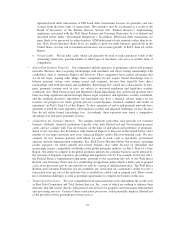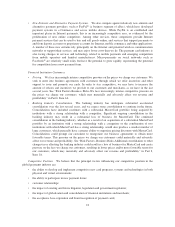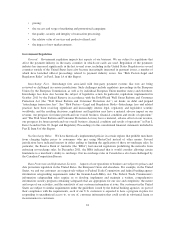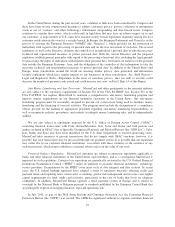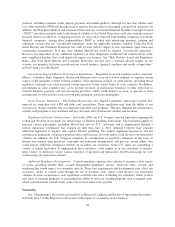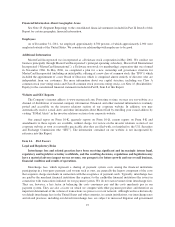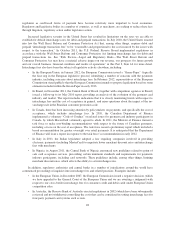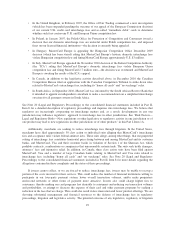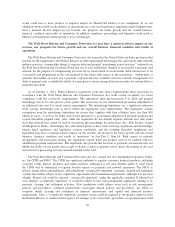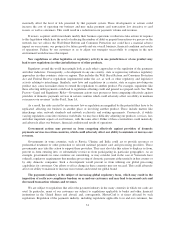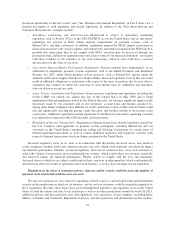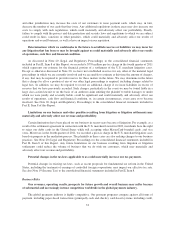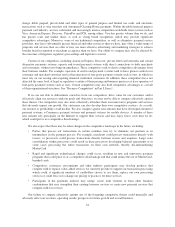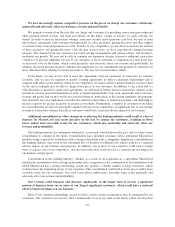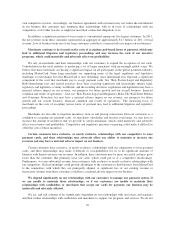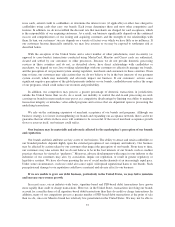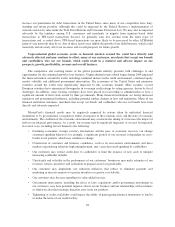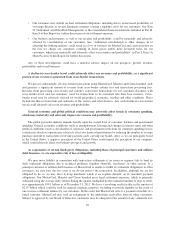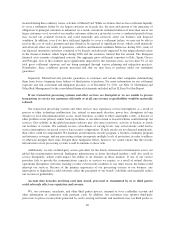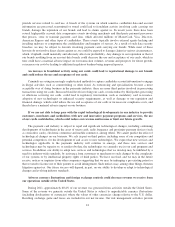MasterCard 2011 Annual Report Download - page 35
Download and view the complete annual report
Please find page 35 of the 2011 MasterCard annual report below. You can navigate through the pages in the report by either clicking on the pages listed below, or by using the keyword search tool below to find specific information within the annual report.materially affect the level of risk presented by that payment system. These developments or actions could
increase the cost of operating our business and may make payment card transactions less attractive to card
issuers, as well as consumers. This could result in a reduction in our payments volume and revenues.
If issuers, acquirers and/or merchants modify their business operations or otherwise take actions in response
to this legislation which have the result of reducing the number of debit or prepaid transactions we process or the
network fees we collect, the Wall Street Reform and Consumer Protection Act could have a material adverse
impact on our revenue, our prospects for future growth and our overall business, financial condition and results
of operations. Failure by our customers or us to adjust our strategies successfully to compete in the new
environment would increase this impact.
New regulations or other legislative or regulatory activity in one jurisdiction or of one product may
lead to new regulations in other jurisdictions or of other products.
Regulators around the world increasingly look at each other’s approaches to the regulation of the payments
and other industries. Consequently, a development in any one country, state or region may influence regulatory
approaches in other countries, states or regions. This includes the Wall Street Reform and Consumer Protection
Act and Federal Reserve regulations implemented under the act, as well as other regulatory and legislative
activity relating to interchange. Similarly, new laws and regulations in a country, state or region involving one
product may cause lawmakers there to extend the regulations to another product. For example, regulations like
those affecting debit payments could lead to regulations affecting credit and general use prepaid cards. See “Risk
Factors—Legal and Regulatory Risks—Government actions may prevent us from competing effectively against
providers of domestic payments services in certain countries which could adversely affect our ability to maintain
or increase our revenues” in this Part I, Item 1A.
As a result, the risks created by any one new law or regulation are magnified by the potential they have to be
replicated, affecting our business in another place or involving another product. These include matters like
interchange rates, network standards and network exclusivity and routing agreements. Conversely, if widely
varying regulations come into existence worldwide, we may have difficulty adjusting our products, services, fees
and other important aspects of our business, with the same effect. Either of these eventualities could materially
and adversely affect our business, financial condition and results of operations.
Government actions may prevent us from competing effectively against providers of domestic
payments services in certain countries, which could adversely affect our ability to maintain or increase our
revenues.
Governments in some countries, such as Russia, Ukraine and India could act to provide resources or
preferential treatment or other protection to selected national payment card and processing providers. These
governments may take this action to support these providers. They may also take this action to displace us from,
prevent us from entering into, or substantially restrict us from participating in, particular geographies. As an
example, governments in some countries are considering, or may consider (and in the case of Venezuela have
ordered), regulatory requirements that mandate processing of domestic payments either entirely in that country or
by only domestic companies. Such a development would prevent us from utilizing our global processing
capabilities for customers. Our efforts to effect change in these countries may not succeed. This could adversely
affect our ability to maintain or increase our revenues and extend our global brand.
The payments industry is the subject of increasing global regulatory focus, which may result in the
imposition of costly new compliance burdens on us and our customers and may lead to increased costs and
decreased transaction volumes and revenues.
We are subject to regulations that affect the payment industry in the many countries in which our cards are
used. In particular, many of our customers are subject to regulations applicable to banks and other financial
institutions in the United States and abroad, and, consequently, MasterCard is at times affected by such
regulations. Regulation of the payments industry, including regulations applicable to us and our customers, has
31



